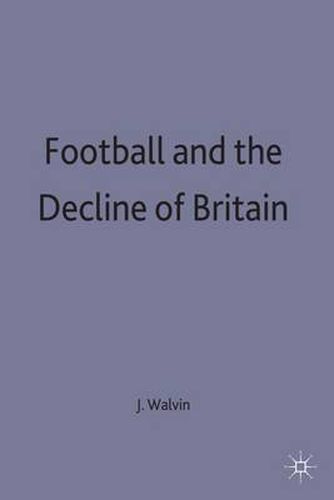Readings Newsletter
Become a Readings Member to make your shopping experience even easier.
Sign in or sign up for free!
You’re not far away from qualifying for FREE standard shipping within Australia
You’ve qualified for FREE standard shipping within Australia
The cart is loading…






This title is printed to order. This book may have been self-published. If so, we cannot guarantee the quality of the content. In the main most books will have gone through the editing process however some may not. We therefore suggest that you be aware of this before ordering this book. If in doubt check either the author or publisher’s details as we are unable to accept any returns unless they are faulty. Please contact us if you have any questions.
In the wake of the Bradford and Brussels football disasters in 1985, football in England was subjected to detailed scrutiny and criticism. Critics - of all sorts and persuasions - saw in those terrible events, especially the Brussels riot, evidence of the broader problems afflicting British (not merely English) life. Football, which had once represented so much of what was once considered good - fair- play, team play and sportsmanship - was now discussed as a major national problem. To most critics, at home and abroad, football came to represent a nation in decline, characterised by organised violence, drunkenness, political extremism and a host of related social problems. It was widely assumed that football - but especially those English fans who travelled abroad - was the epitome of what had gone wrong with life in urban Britain. It is understandable that those disasters would lead to heated and emotional argument. But many of the explanations of the events culminating in the disasters appear less convincing when scrutinised more closely. This book tries to examine not only the alleged roots of those violent incidents, but also to locate the problems afflicting the national game within the context of the broad social and economic changes which have transformed British life in the past generation. The book is as much an analysis of recent British social history as it is about the game of football.
$9.00 standard shipping within Australia
FREE standard shipping within Australia for orders over $100.00
Express & International shipping calculated at checkout
This title is printed to order. This book may have been self-published. If so, we cannot guarantee the quality of the content. In the main most books will have gone through the editing process however some may not. We therefore suggest that you be aware of this before ordering this book. If in doubt check either the author or publisher’s details as we are unable to accept any returns unless they are faulty. Please contact us if you have any questions.
In the wake of the Bradford and Brussels football disasters in 1985, football in England was subjected to detailed scrutiny and criticism. Critics - of all sorts and persuasions - saw in those terrible events, especially the Brussels riot, evidence of the broader problems afflicting British (not merely English) life. Football, which had once represented so much of what was once considered good - fair- play, team play and sportsmanship - was now discussed as a major national problem. To most critics, at home and abroad, football came to represent a nation in decline, characterised by organised violence, drunkenness, political extremism and a host of related social problems. It was widely assumed that football - but especially those English fans who travelled abroad - was the epitome of what had gone wrong with life in urban Britain. It is understandable that those disasters would lead to heated and emotional argument. But many of the explanations of the events culminating in the disasters appear less convincing when scrutinised more closely. This book tries to examine not only the alleged roots of those violent incidents, but also to locate the problems afflicting the national game within the context of the broad social and economic changes which have transformed British life in the past generation. The book is as much an analysis of recent British social history as it is about the game of football.